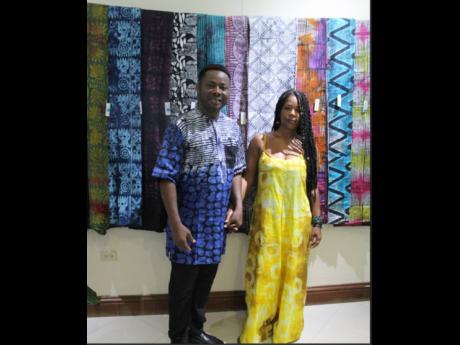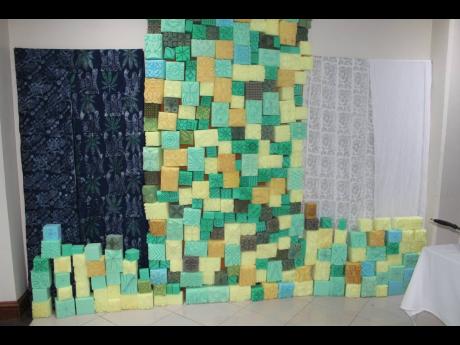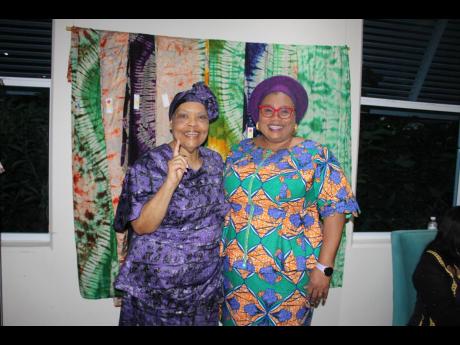JBDC bats for a Jadire fabric cottage industry
EXECUTIVE DIRECTOR of the Jamaica Business Development Corporation (JBDC), Valerie Veira, wants a vibrant and sustainable Jadire batik textile cottage industry. She expressed that desire at the recent opening of Alao Luqman Omotayo’s solo exhibition of Jadire batik fabrics in the hall of The University of the West Indies Regional Headquarters, along Mona Road in St Andrew.
Alao is Nigerian cultural diplomat working at the JBDC for the past six years through bilateral relationships between Jamaica and Nigeria. He has been training many cohorts in a variety of skills, including the production of Jadire, a tie-dye batik fabric with a Jamaican essence. Jadire is the combination of the J from Jamaica and adire, a Yoruba word meaning tie-dye. And now, the trainer himself is having his own show.
But, Veira said she regarded the project as more than an exhibition. “It is really a fantastic presentation of a body of work, which is critical to the development of a cottage textile industry,” she said, before thanking the Nigerian government and the Ministry of Foreign Affairs and Foreign Trade for Alao being here in Jamaica way over his initial six-month contract.
She continued by saying the show is not a novelty one, “showing off nice products” in a one-off affair. Rather, there is a programme to develop a textile industry, “an industry that speaks to inclusive development”, which would include an entire value-chain process that would benefit a variety of stakeholders. It’s a 100-per-cent Jamaican industry that Veira is envisioning.
In speaking to the value-chain process, Alao said it could involve the importation of the original base fabrics, creating income for fabric wholesalers; the production of local dyes; designing of the Jamaican symbols; selling of foam; making of foam stamps; the production of Jadire for fashion designers, etc.
The main challenge for the Jadire industry would be the acquisition of dyes, which are expensive, from abroad. Jamaica’s weather is perfect for the cultivation of indigo plants which produce a rich blue dye, commonly used in batik production. Thus, the fabric industry would also give rise to a local dye-production industry. Indigo was once a popular export from Jamaica.
Alao has brought the Jadire technology to Jamaica, but Veira noted that she, herself, Alao, the JBDC and the Nigerian High Commission are pushing for the Jadire fabrics to tell our stories, not those of Nigeria. Thus, stories of Jamaica are embedded in the design of the fabrics (which are actually for sale) on display at The UWI’s headquarters.
“We want our textiles to be walking storybooks, telling our story, telling our history, et cetera,” Veira said. Thus, the JBDC is working with Alao to develop a story bank of Jamaican symbols. There is also the hope to see Jadire fashion collections “telling our story all the time … all the flavours of our story”. Jadire is a registered trademark, which is an indication of the “seriousness” of the intention to establish a Jadire fabric cottage industry, she also revealed.
Also addressing the gathering was Nigerian High Commission to Jamaica Dr Maureen Tamuno who declared the exhibition open. She briefly talked about the rise of adire in Nigeria from cottage industry to mass production, noting that adire is significant because of its sustainability and eco-friendliness.
The process uses dyes made from plants and minerals. This, she said, is in alignment with the increasing global demand for ethical and environmentally friendly products, and that adire production supports local community development. It is also about preserving traditional skills and heritage, as fabrics represent who we are.
“We need to be proud of what we have; our heritage is our culture,” Dr Tamuno stated. Jamaica then should build on what has been started, and take the skills of producing Jadire to “the nooks and crannies”. But, is a Jadire fabric cottage industry sustainable?
Alao said yes. “Jamaica has everything to have a cottage industry.” This includes a vibrant tourist industry, which could be a serious market for the fabrics, and the weather is ideal, just like in Africa, where the production of adire is significant, from people who are still at the cottage-industry stage to large-scale producers, he explained.
As it relates to the general feedback to the exhibition so far, Alao said it is “tremendous”. People have been calling and visiting, expressing serious interests in the purchase of the fabrics and the production of such. He is hosted at the Jamaica Business Development Corporation where he is the principal trainer in Jadire production. The exhibition continues until September 16.



